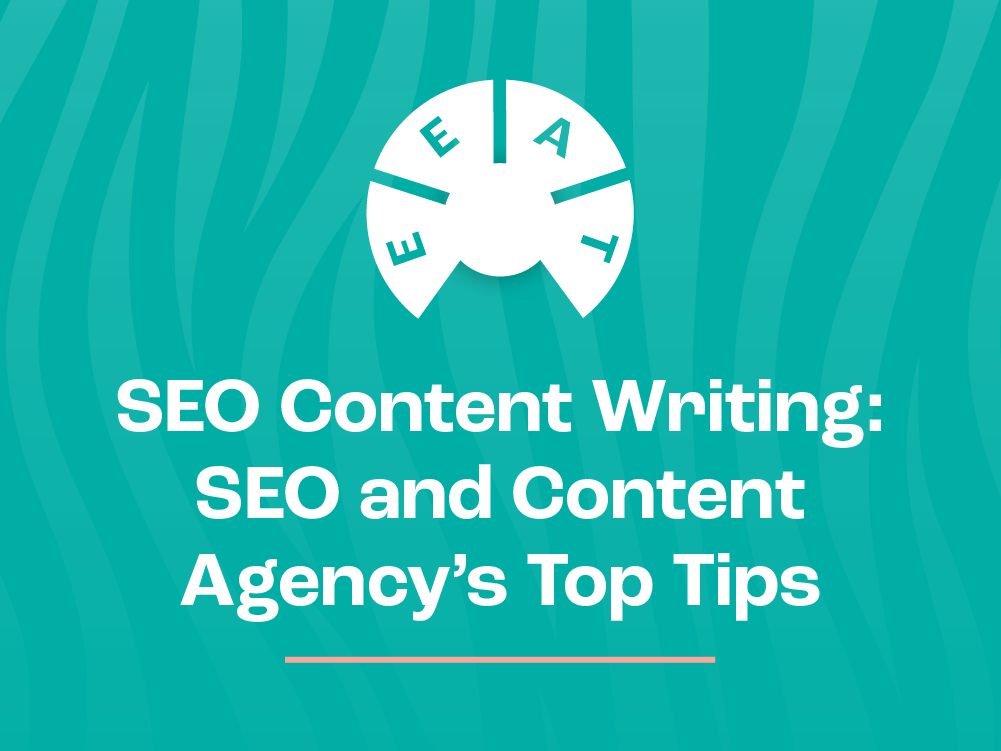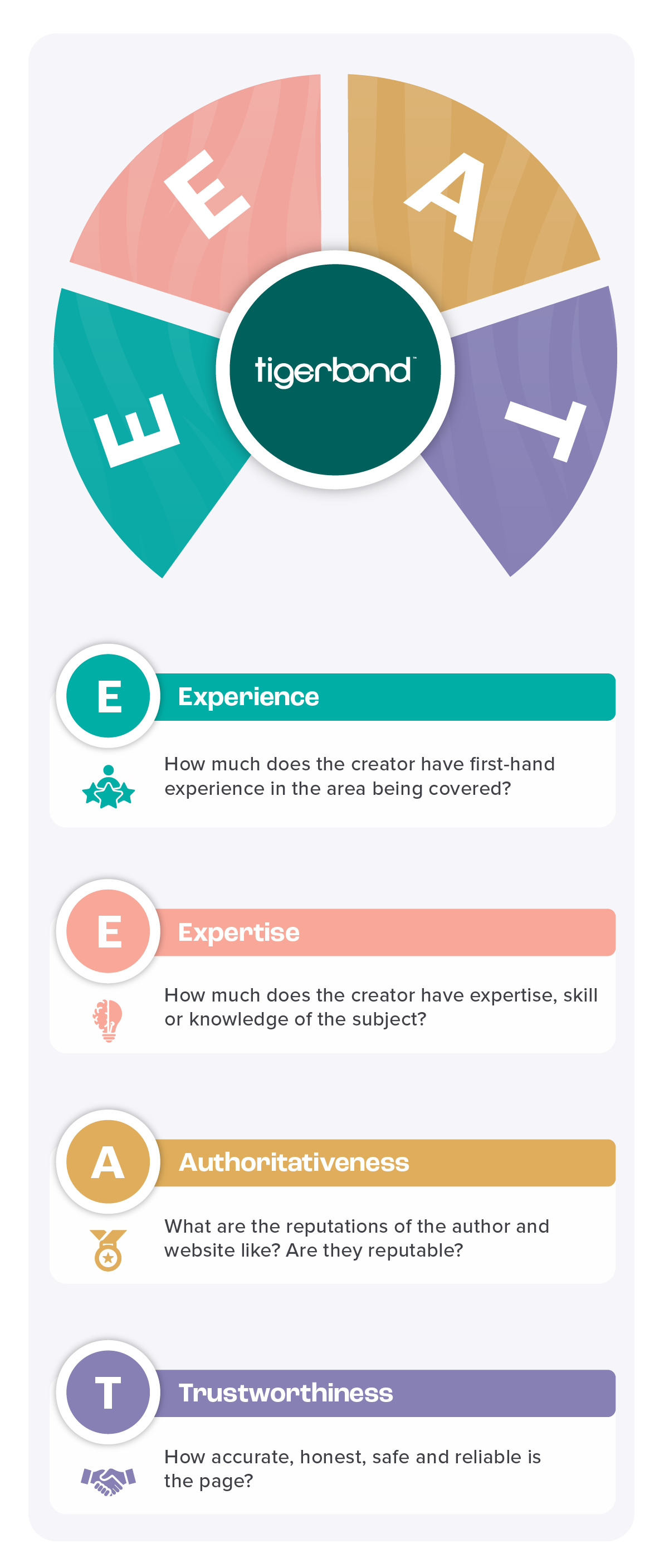
Search Engine Optimisation, SEO, can make or break your online presence. If you’re not showing up in searches, whether this be on Google or social media such as TikTok, it makes it incredibly difficult for potential customers to find you, especially in a crowded landscape.
This is why having a solid content and SEO strategy should make up a large chunk of your marketing plan.
While employing an SEO and content agency is one of the easiest ways to improve your rankings, understanding the processes and terms involved will help you write a comprehensive SEO content brief to get the most from your agency partner.
In this guide, we will define and explain some common SEO terms and provide some hints and tips from tigerbond’s digital marketing experts.
Contents
- What is SEO?
- How important is structure in SEO?
- What is High Quality Content?
- What is Helpful Content?
- What is Search Intent?
- How Can I Do Keyword Research?
- How Can I Improve Website Performance?
- The Future of SEO: How will AI and Search Generative Experience (SGE) affect SEO
- Conclusion
- TL;DR
What is SEO?
SEO, or Search Engine Optimisation, is the practice of making online content easy to find.
This increases the quality and quantity of visitors to your site and increases ROI and customer spend.
SEO goes beyond search engines and is something you should consider on social media platforms too, such as TikTok.
How important is structure in SEO?
A well-structured blog post plays a large part in enhancing the posts visibility and effectiveness as this ensures that the content not only aligns with SEO best practices but also makes the copy easy to read.
Utilising a structure is also a great way to incorporate keywords into your blog as subheadings are easily picked up by search engines, making this the perfect opportunity to answer questions that you target audience are asking.
Content that uses a well thought out structure also ranks higher for quality.
What is High Quality Content?
In the digital age, the quality of content plays a key part in determining success.
We’ve broken down what makes content high-quality and how you can optimise it for better SERP rankings.
- Originality and Value:
- Ensure that your content is unique and offers value to readers.
- Avoid duplicating content from other sources and focus on providing insights that are distinct to your brand, perspective, or expertise.
- Relevance to Search Terms:
- Align with the search terms or keywords you aim to rank for.
- You can incorporate these keywords naturally within your content to enhance its relevance and improve its chances of ranking higher on search engines.
- Stay Updated with Fresh Content:
- Structured Content for Enhanced Readability:
- A well-structured content layout not only enhances the reader's experience, but also aids search engines in understanding the hierarchy of your content.
- Utilise headings and subheadings (such as ‘H2, H3, H4’) effectively in your content.
- This not only improves the readability, but also signals to Google the structure and importance of various sections.
What is Helpful Content?
Helpful Content is the term that Google uses to describe the content that it prioritises based on page experience, people first content and the quality of the writing.
This helps the search engine ‘reward’ content that readers have been satisfied with above content that has not, such as click-bait or keyword stuffing.
One way to sense check your article or blog is to utilise the E.E.A.T. quality check method:
E = Experience & Expertise
Experience
Include first-hand experiences and opinions to the subject matter, such as adding quotes or case studies.
Expertise
Provide evidence that your content is being delivered by the best brains in the business.
A = Authoritativeness
Usually achieved by linking so this will build up over time as part of the larger SEO picture, however it is worth noting that the other elements of EEAT will feed into this as if your content is useful, more people will link back to it.
T = Trustworthiness
Citing sources that can be trusted, thoroughly researching the topic and being clear about who is writing the piece will all help in letting people (and search engines) know that your content is valuable and worth reading, pushing it to the top of the results page.

What is Search Intent?
Google places high value on content being able to match the search intent of the user and search intent simply means whatever the user is trying to achieve when conducting their search.
This can be done by creating content that focuses on what users are searching for about the product or service that you are offering.
You may also find it useful to conduct some keyword research to find relevant content that is currently ranking well to help you understand what users are looking for.
How Can I Do Keyword Research?
There are many tools available for keyword research online, and some are even free to use!
Below we have listed some of the tools, what they are best for and what the free plan includes:
| Ahrefs | Moz Keyword Explorer | SEMrush | |
|---|---|---|---|
| Best For | 10 queries per month | All round research | Advanced SEO Professionals |
| Free Tools | Keyword generator (up to 150 words) Keyword difficulty checker with difficulty score and SERP analysis for top 10 results |
10 queries per month 1000 keyword suggestions 10 tracked keywords per month 10 SERP analyses |
10 analytics reports per day 10 tracked keywords |
How Can I Improve Website Performance?
Website loading speed is another crucial ranking factor for Google SEO as a slow website will have a negative impact on user experience (UX).
The aim here is to be able to load quicker than your competitors, even if that means being able to cut speeds by milliseconds with each update to your site.
This can include several actions, for example:
- Reducing the number of plug-ins or third-party add-ons that your site uses.
- Applying lazy-loading rules (set to load after more critical parts of your site have loaded) to content, images or fonts that are where we call ‘below-the-fold' (any part of a website that is not visible without having to scroll) to optimise above-the-fold content.
- Reducing the overall file size (in MB) of the media on your web page. This can include reducing the file size of individual images, using WebP converters (smaller than JPEG and PNG), or reducing the file size of videos with a compression tool.
- There are plenty of other things you can do to help improve loading speeds, however, seeking the help of a front-end developer to optimise the code on the site is always an option when you need further support.
The Future of SEO: How will AI and Search Generative Experience (SGE) affect SEO
Search Generative Experience (aka SGE), is a newest type of search experience that uses generative AI to give users more comprehensive and informative results.
It works by understanding the user's intent behind their search query and generating a snapshot of key information that is relevant to the user's needs.
At the time of writing, is still in the testing phase and has not been officially rolled out with Google, however we are starting to see the beginnings of it being featured in Microsoft’s search engine, Bing.
The results are not fool proof though as AI is still learning, along with SEO and content professionals, about how to make your content rank or be featured on SERPs.
It appears that authority will be an important factor along with high-ranking pages and search intent, so ensuring your content is high quality, relevant and answers questions in full, as well as writing online content that follows best practice rules, should stand you in good stead when SGE is switched on.
Conclusion
In this digital centric world, SEO is a vital tool for enhancing your online presence.
Whether it’s Google or popular social media platforms like TikTok, being visible in search results is critical for connecting with potential customers.
A strong content and SEO strategy should be a cornerstone of your marketing plan, ensuring you are effectively discovered by your target audience.
While utilising the knowledge of an SEO and content agency is a straightforward way to boost your rankings, understanding the fundamentals and terminology empowers you to collaborate effectively and craft comprehensive SEO content briefs.
As you embark on your SEO journey, armed with these insights and tips, remember that success lies in staying updated, adapting to evolving algorithms, and continuously refining your approach.
Your online visibility and reach are in your hands; make the most of them through informed decisions and strategic content creation.
Ready to take your SEO and content strategy to the next level?
Speak with a tigerbond Digital Marketing and SEO expert at the UK’s most established agency!
We can’t wait to work with you!
TL;DR
- SEO is crucial for online visibility, affecting visitor quantity and quality.
- High-quality content must be original, relevant, fresh, and well-structured.
- Understanding user search intent and conducting effective keyword research are key to success.
- Optimising website performance, especially loading speed, is vital for enhanced user experience and better rankings.
- Stay informed, adapt, and craft compelling content to boost your online presence and connect with your target audience.
